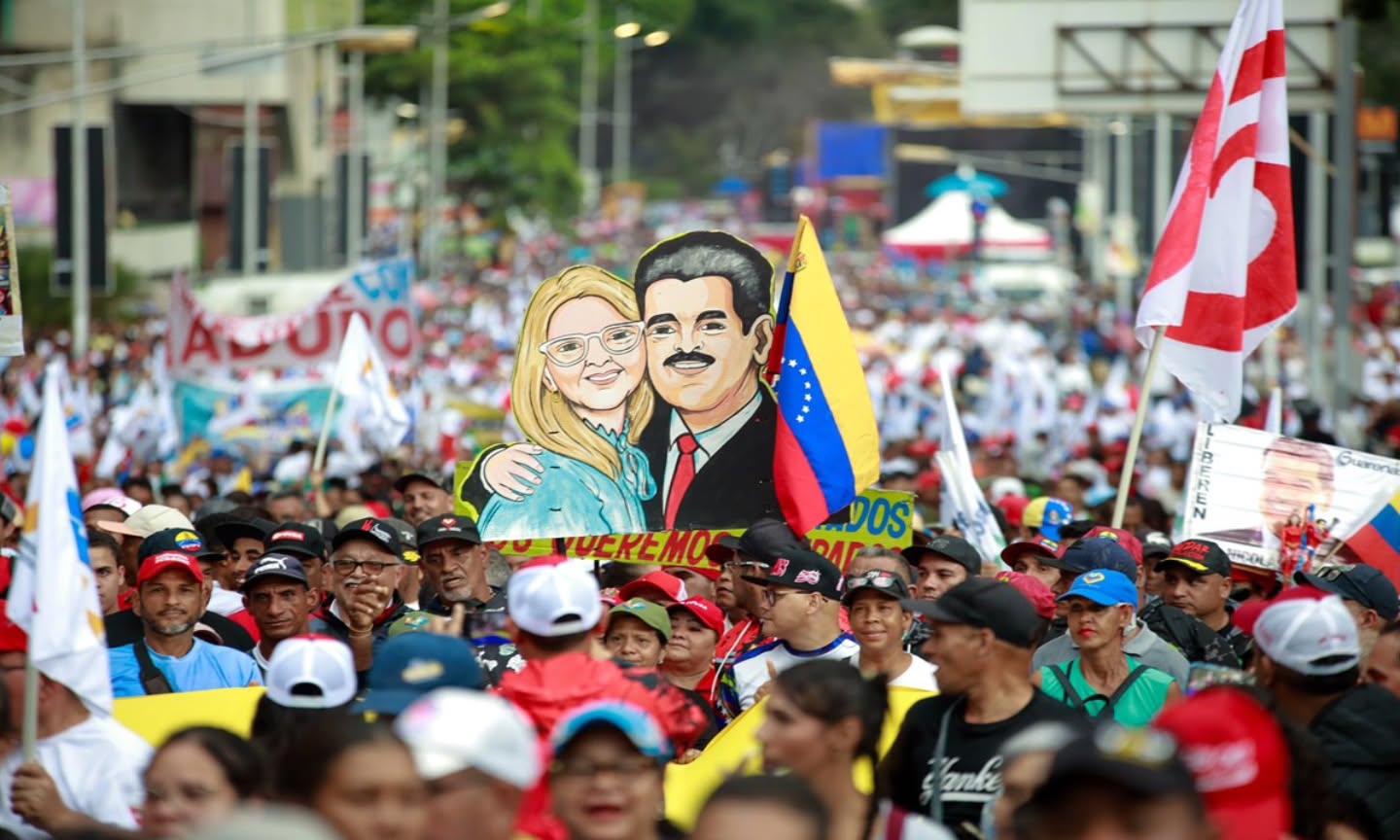Venezuelans Stage Mass Rally, Demand Maduro Liberation and Return
Venezuelan government supporters have taken to the streets to protest against the US attack and presidential kidnapping. (Presidential Press)
Caracas, February 4, 2026 (venezuelanalysis.com) – Chavista supporters filled the streets of Caracas on Tuesday to demand the release of President Nicolás Maduro and First Lady and Deputy Cilia Flores.
The rally marked one month from their kidnapping on January 3 as part of a US military attack against Venezuela.
“We, as an organized people, are making a call to the international community. We work every day to build a country with sovereignty and we will maintain our demand. We will continue protesting,” activist Jonas Reyes told reporters. He also paid tribute to the Venezuelan and Cuban civilians and military personnel killed during the bombing.
Venezuelan government leaders also announced plans to mobilize on February 14, Valentine’s Day, to celebrate what they described as “the profound love of Maduro and Cilia,” as well as on February 27 and 28 to commemorate the 1989 popular uprising known as El Caracazo.
On Tuesday evening, Venezuela’s acting president, Delcy Rodríguez, said that over the past 30 days Venezuela has “transformed and matured” the impact of US aggression into “tranquility,” while promoting national dialogue.
“It is a great victory for the people that there is stability,” Rodríguez told media, adding that “there is a national outcry” for the freedom of Maduro and Flores. She spoke from the Miraflores Palace alongside National Assembly President Jorge Rodríguez and Interior Minister Diosdado Cabello.
The pair’s kidnapping took place amid a US attack involving 150 aircraft, including electronic warfare jets, bombers, assault helicopters, and drones invading Venezuelan airspace.
On January 5, Maduro and Flores were arraigned in New York on charges including drug trafficking conspiracy. Both pleaded not guilty, and Maduro stated before judge Alvin Hellerstein that he is “a prisoner of war.”
The next court hearing, originally scheduled for March 17, was postponed until March 26 following a request from the US Justice Department.
US prosecutors argued that the extension would allow “the ends of justice to outweigh the interests of the public and the defendants in a speedy trial.”
February 3 also saw US-bases solidarity gather outside the Metropolitan Detention Center (MDC) in Brooklyn where Maduro and Flores are being held.
In slogans and posters, activists described the Venezuelan president and first lady as “victims of kidnapping” and demanded that the US government cease its “political persecution.”
“They are innocent of all charges. The guilty parties are the same ones who have been violating the sovereignty of Venezuela and so many countries of Our America,” activist and academic Danny Shaw told reporters. “This has nothing to do with a war on drugs. We have suffered from fentanyl and heroin, and that has nothing to do with Venezuela, much less with its president.”
Shaw vowed that solidarity movements would continue to rally and expressed confidence in the legal efforts of Maduro and Flores’ defense teams.
A separate demonstration in solidarity with the Venezuelan people and denouncing US aggression also took place in New York’s Times Square and some 60 cities around the world.
For her part, Acting President Delcy Rodríguez said she has held direct phone conversations with US President Donald Trump and Secretary of State Marco Rubio, which she said were guided by “interpersonal respect.”
Rodríguez has defended a fast diplomatic rapprochement with the Trump administration, arguing that the two nations can solve “differences” through diplomacy.
Washington’s new chargé d’affaires, Laura Dogu, is already in Venezuela and visited the presidential palace on Monday, February 2.
Edited by Ricardo Vaz in Caracas.
